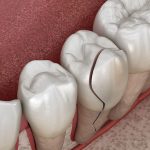The temporomandibular joint (TMJ) is an essential part of our oral system. It allows us to perform the complex movements involved in chewing, speaking and other crucial everyday activities. If a person suffers from a TMJ dysfunction, it can give rise to a range of symptoms that significantly impact their quality of life.
The TMJ is located on either side of the face, just in front of our ears. The joint connects our mandible (the lower part of the jaw) to the skull. It is one of the most complex joints in the human body, and can withstand enormous pressure. The temporomandibular joint complex is made up of a dense disc of fibrocartilage that acts like a cushion between the skull and mandible, limiting any friction between the two bones.
If you’re experiencing jaw pain, annoying clicking noises, or other disruptive symptoms, you may be suffering from a TMJ dysfunction. Our clinic specializes in oral maxillofacial surgery, and we have written this article to provide you with clear, practical information on what to do if you think you may have a TMJ disorder.
Symptoms of a TMJ problem
The symptoms of temporomandibular joint disorders manifest themselves in a variety of ways, and can have a significant impact on your daily life. By learning to recognize the signs, you’ll be better equipped to decide when to consult a dental professional, such as a maxillofacial surgeon.
- Headaches: TMJ disorders are sometimes associated with frequent headaches, or even migraines. Muscle tension and imbalances in the jaw can contribute to these symptoms.
- Jaw pain: Pain is often one of the first signs of TMJ disorders. It may be localized to the jaw itself, or be near the ear or down the neck, causing backache. It can be acute or chronic, and can fluctuate in intensity.
- Mastication problems: In the event of a disorder, chewing may be difficult and painful. Some patients report a sensation of blocking or shifting when trying to open or close their mouths.
- Cracking or noises in the joint: Unusual noises, such as cracking, clicking or crackling when the jaw moves may indicate TMJ abnormalities. These sounds may or may not be accompanied by pain.
- Ear sensations: Some patients experience buzzing, dizziness or pressure, due to the proximity of TMJ to the ear.
- Facial stiffness: Facial stiffness or fatigue, often felt most intensely in the morning, can also signal TMJ-related problems.
- Changes in your bite: If you notice changes or shifts in the way your teeth meet, this may be a sign of a TMJ disorder.
Causes of TMJ disorders
Temporomandibular joint disorders can arise from a variety of causes. Understanding these factors can help you better understand the origins of any symptoms you may be experiencing. Here’s a list of common triggers:
- Stress, isolation, and fatigue can lead to myofascial pain syndrome
- Facial trauma
- Poor chewing habits
- Dental malocclusion
- Arthritis
How is temporomandibular disorder diagnosed?
To diagnose a TMJ problem, you need to have the joint examined by a maxillo-facial surgeon, a dentist or a doctor. During the appointment, the specialist may use their fingers to palpate the area and ask you to perform certain movements to confirm the presence of a dysfunction.
The medical professional may also perform imaging or other procedures, depending on your symptoms, to accurately diagnose the origin of your discomfort. The only way to confirm the presence of a temporomandibular dysfunction is by making an appointment with a specialist.
TMJ treatments
Treatment options differ depending on the type of disorder. In the case of a malocclusion, you may be advised to undergo orthognatic surgery. This involves realigning your jaws to correct functional problems.
In some cases, you may be advised to wear a mouthpiece, undergo orthodontic treatment or take painkillers such as non-steroidal anti-inflammatory drugs.
It’s also possible to reduce pain by following these tips:
- Eat soft foods or cut your food into small pieces to reduce the pressure when you bite
- Stop using gum or eating other treats that are difficult to chew
- Avoid always chewing on the same side
- Allow your jaws to rest as much as possible by not clenching your teeth
- If you yawn, put your hand under your chin to avoid opening your jaw too wide
TMJ pain? Make an appointment at Clinique MFML
Temporomandibular joint problems can be very unpleasant, causing pain that impacts the quality of your daily life. It’s important to find the cause of the disorder so you can get the right treatment.
If you’re experiencing temporomandibular joint discomfort or pain and are looking for a Montreal maxillofacial surgery specialist to evaluate your jaw, visit Clinique MFML. Make an appointment with a maxillofacial surgery specialist today and get the help you need to regain your comfort.




